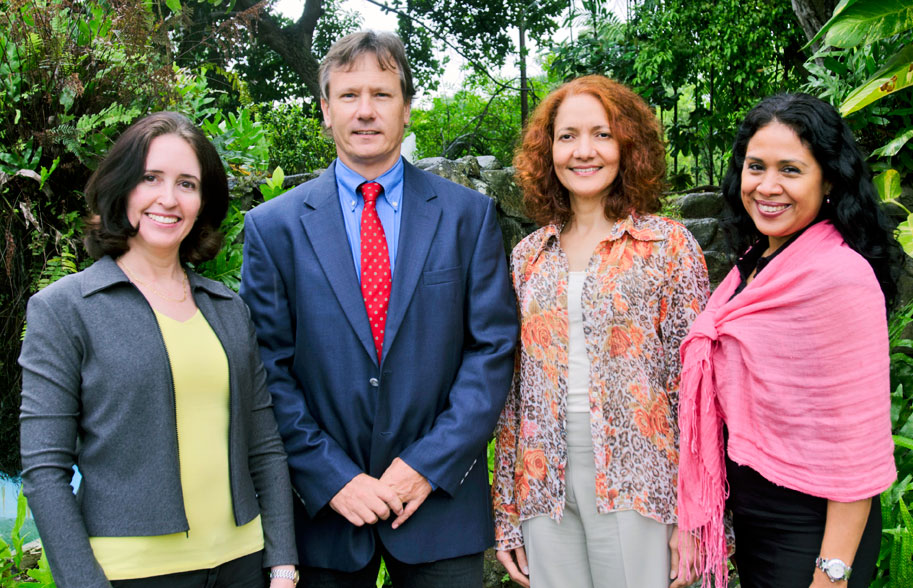Some Heavy Duty Scholarship at STRI

STRI Academic Program Staff from Left to Right: Adriana Bilgray, Owen McMillan, Nelida Gomez, Nilka Tejeira
As Dean of Academic Programs at the Smithsonian Tropical Research Institute (STRI) in Panama, Owen McMillan takes a leading role in shaping STRI’s academic mission and programs. He writes about some of STRI’s accomplishments in 2013 and plans for 2014 here:
As 2013 comes to an end, the Office of Academic Programs would like to wish you a Happy Holiday Season, to thank you for your support over the past year and to share with you some of our community’s accomplishments. A new year will soon begin, full of new ideas and opportunities to strengthen an already rich training ground for future tropical researchers. We are a truly international scholarship community representing some 56 nationalities– with 47% of our scholars coming from Latin America, 34% from North America and 19% from Europe, Asia, Australia, and Africa. There is no other institution that we are aware of that matches the diversity within the STRI scholarship community. This diversity provides opportunities for peer-peer cultural interactions, which greatly enriches both the student’s experience and our scientific community.
In FY 2013, STRI invested slightly over 2.2 million dollars supporting 244 students, including 145 interns, 77 graduate students, and 22 postdoctoral researchers. This community was vital for creating the new knowledge that fueled STRI science this fiscal year. Fellows were coauthors on over a third of STRI’s 472 publications, including a paper on the dynamics of tropical forest regeneration led by Sarah Batterman and published recently in the journal Nature. Our fellows formed the nucleus of a much larger scholarship community of STRI visitors composed of approximately 155 postdoctoral researchers, 424 graduate students, and 563 undergraduate students, including 628 US students from 45 States.
We have a rich history of backing creative scholars in the incipient stages of their careers and efforts to strengthen our scholarship community are the cornerstone of Academic Programs at STRI. Last year, we inaugurated the first Integrative Tropical Biology Semester at STRI. The program was established through an NSF Integrative Graduate Education and Research Training (IGERT) grant in Biodiversity Genomics. In its first year, the STRI based IGERT hosted 16 first-year graduate students from the University of Illinois, Arizona State University, and McGill University for a three-week Introduction to Tropical Ecology field course, followed by 3 months of directed research in areas ranging from animal behavior to plant physiology. The semester provides an excellent introduction to STRI science and over half of the first cohort will perform a significant portion of their graduate research in Panama. The second cohort arrives in January 2014.
In the coming year, we will continue to strengthen and support STRI’s scholarship community. We are developing a strategic plan for our internship community that builds from our considerable legacy of training young scholars in cross-cutting science. Interns are the largest component of our scholarship community and we took several steps to ensure that the STRI internship experience remains transformational. Specifically, we developed a strategy to better support the mentor-driven research experience that includes curated opportunities for intellectual and personal development. The strategy was formalized in a $356k Research Experience for Undergraduates grant proposal in review at NSF. If funded, our “Integrative Tropical Biology Program” will provide support for an additional 15-20 interns per year.
In addition, we are taking steps to further strengthen the NEO program. NEO is an 11-year partnership with McGill University to train graduate students in tropical biology and conservation. Significantly, the NEO program drafted a $2.6 million grant to fund graduate and undergraduate training in biodiversity and sustainability science. The proposal passed several rounds of increasingly rigorous review and was invited for full submission by Canada’s Natural Sciences and Engineering Research Council. It is currently under final review.
The success of STRI’s scholarship program is direct result of the exceptional scientific and administrative community at STRI. We thank you for your efforts over the past year and we look forward to working closely with you to make 2014 even better. Our best wishes for a wonderful holiday season and a New Year filled with peace and happiness.
W. Owen McMillan, Academic Dean and Staff Scientist
Office of Academic Programs
You can find out more about academic programs at STRI here.






